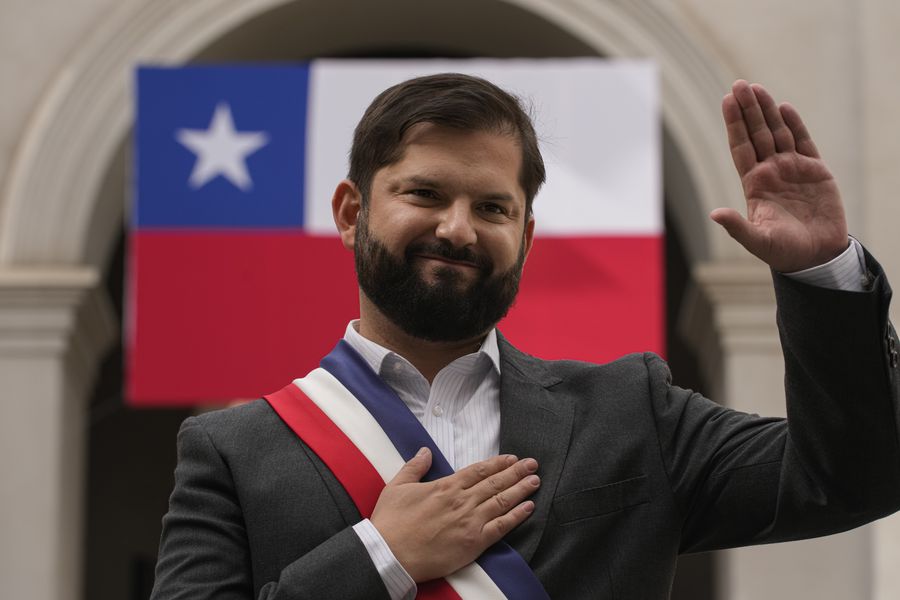RIO DE JANEIRO, BRAZIL – Chile’s President Gabriel Boric came to power 100 days ago amid high expectations, buoyed by a citizenry eager for change, but his “honeymoon” has been the shortest since the return to democracy.
His first 100 days have been a roller coaster ride, with a promising start overshadowed by an inflationary and security crisis and some stumbles by some of his ministers, followed by a rebound after his first Address to the Nation, a successful international tour and the approval of a historic minimum wage hike.
The president, who is 36 and is the youngest in Chilean history, acknowledged in April that he had experienced “turbulence” in his take-off.

After more than two months with the polls down and an approval rating below 30%, the trend turned around, and his approval began to rise in the last few days to reach 44%, according to the Cadem poll.
Formed in the student struggles, Boric won the elections with a coalition between the Frente Amplio and the Communist Party and was the first president who was not part of the large blocs that had governed since the end of the dictatorship.
“We are here for a mandate for change, and we have to push for a new model that is fairer, that is ecologically more sustainable, that allows us to incorporate women in a better way,” he said on Friday when taking stock of these months.
His landing in La Moneda palace came at a particularly difficult time, with inflation unprecedented in decades, an increase in the perception of insecurity, and a resurgence of the “Mapuche conflict“.
“It is the most complex installation since Patricio Aylwin in 1990,” Claudio Elórtegui-Gómez of the Catholic University of Valparaíso told Efe.
Fabricio Franco, director in Chile of the Latin American Faculty of Social Sciences (Flacso), believes that whoever won the elections “would have had a serious problem governing”.
“It is not easy for any government in the region to govern today, even less so for one that has promised an important turnaround,” he assured Efe.
Among his achievements is the increase in the minimum wage to CLP 400,000 (US$450) as of August, the largest readjustment in 25 years, an achievement that Mauricio Morales of the University of Talca attributes to Finance Minister Mario Marcel, former president of the Central Bank.
“He is the central figure in the cabinet, together with spokesperson Camila Vallejo, who has managed to transmit the messages efficiently,” he told Efe.
In addition to the minimum wage, the government has carried out other economic measures, such as freezing transport fares or stabilizing fuel prices.
It also ratified the Escazú Agreement, the first pact in the world to contemplate the rights of environmentalists, and announced that it would present the expected tax and pension reforms during the year.
“The main triumph is to have installed seriousness to the economic management when the temptation to enter into populism was high”, declared Elórtegui-Gómez.
With his recent trip to Canada and the United States to participate in the Summit of the Americas, Boric managed to distance himself from the region’s authoritarian left and ensured that “no one in the U.S. and Canadian public administration sees a leap into the void in what has been done since March,” according to Franco.
His critics accuse him of inexperience and improvisation, especially in dealing with the violence in the south, where he declared a state of emergency and deployed the military, despite promising in the campaign that he would not do so.
The Minister of the Interior, Izkia Siches, is the one who has had the most setbacks, and the opposition has asked for her resignation several times, especially when she accused the previous government of irregularities in the deportation of migrants with erroneous information.
“Left-wing governments tend to have difficulties in dealing with public security issues”, the director of Flacso emphasized.
For Juan Pablo Araya from the State University of O’Higgins, the mistakes have to do with the ruling coalition’s lack of experience and “problems of political coordination and control of the agenda”.
“In 2010, when Sebastián Piñera came to power with the first right-wing coalition after the coup d’état, there were quite similar problems. However,” he concluded, “the current political climate could be having an amplifying effect”.
With information from EFE

